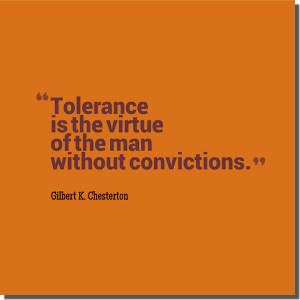suffering from tolerance
Venerable Archbishop Fulton J. Sheen was a prolific writer, commentator, moral theologian, and philosopher as well as a bona fide television star. His weekly television show Life is Worth Living was amazing not only for being carried on ABC from 1952 until 1957 and on other networks under different titles until 1968 but for being the most widely-viewed religious series in television history, averaging over ten-million viewers every week. All this despite the fact that the show, shown only in black and white and hosted by Bishop Sheen, consisted mainly of he in his clerics speaking to the camera discussing moral issues of the day from an clearly Catholic perspective.

Tolerance
Often quoted, he once observed that “America, it is said, is suffering from intolerance – it is not. It is suffering from tolerance. Tolerance of right and wrong, truth and error, virtue and evil, Christ and chaos. Our country is not nearly so overrun with the bigoted as it is overrun with the broadminded.”
Archbishop Sheen was never reticent to speak out bluntly and forcefully even if it engendered controversy for as he once stated, “The refusal to take sides on great moral issues is itself a decision. It is a silent acquiescence to evil. The Tragedy of our time is that those who still believe in honesty lack fire and conviction, while those who believe in dishonesty are full of passionate conviction.”
Many today may find it puzzling that Bishop Sheen would suggest that we are “suffering from tolerance” and yet he was exceedingly perceptive in his observation, an observation that came from understanding the impact and the dangers of subjective moral relativism, the philosophy espoused by Baruch Spinoza.
Spinoza asserted that the “government inculcates into its citizens the belief that the chief of all the virtues is tolerance—the affirmation of everyone’s right to believe anything he wants as long as he behaves himself in public. To put the principle in a form that’s familiar to us, dogma is subjective. What people believe is entirely a personal matter. What matters is whether they disturb the peace or physically hurt someone else.”[1] It is this so-called right to believe in God in whatever manner each and every person so chooses that has ultimately removed the church from the public square and it is the belief in the individual right that actually creates the need for the secular state. “The more that right is believed and acted upon, the more we need the secular state to protect our right to believe what we want, against other people’s conflicting religious beliefs.”[2]
Spinoza espoused a philosophy of subjective relativism which directly contradicts objective truth. Religious freedom, liberty, as viewed by the church is deeply rooted in the understanding that the greatest human desire is to seek the highest truths. In other words, the right to seek the truth (the church’s view) is not the same as the right to define the truth in whatever way one desires (Spinoza’s view.)
Our “silent acquiescence” is both frighteningly obvious and undeniably revealing. We should never forget the words of Edmund Burke who wrote “All that is necessary for the triumph of evil is that good men do nothing.”
[1] Benjamin Wiker, Ph. D., Worshipping The State: How Liberalism Became Our State Religion, March 25, 2013, Regnery Publishing.
[2] Ibid.
